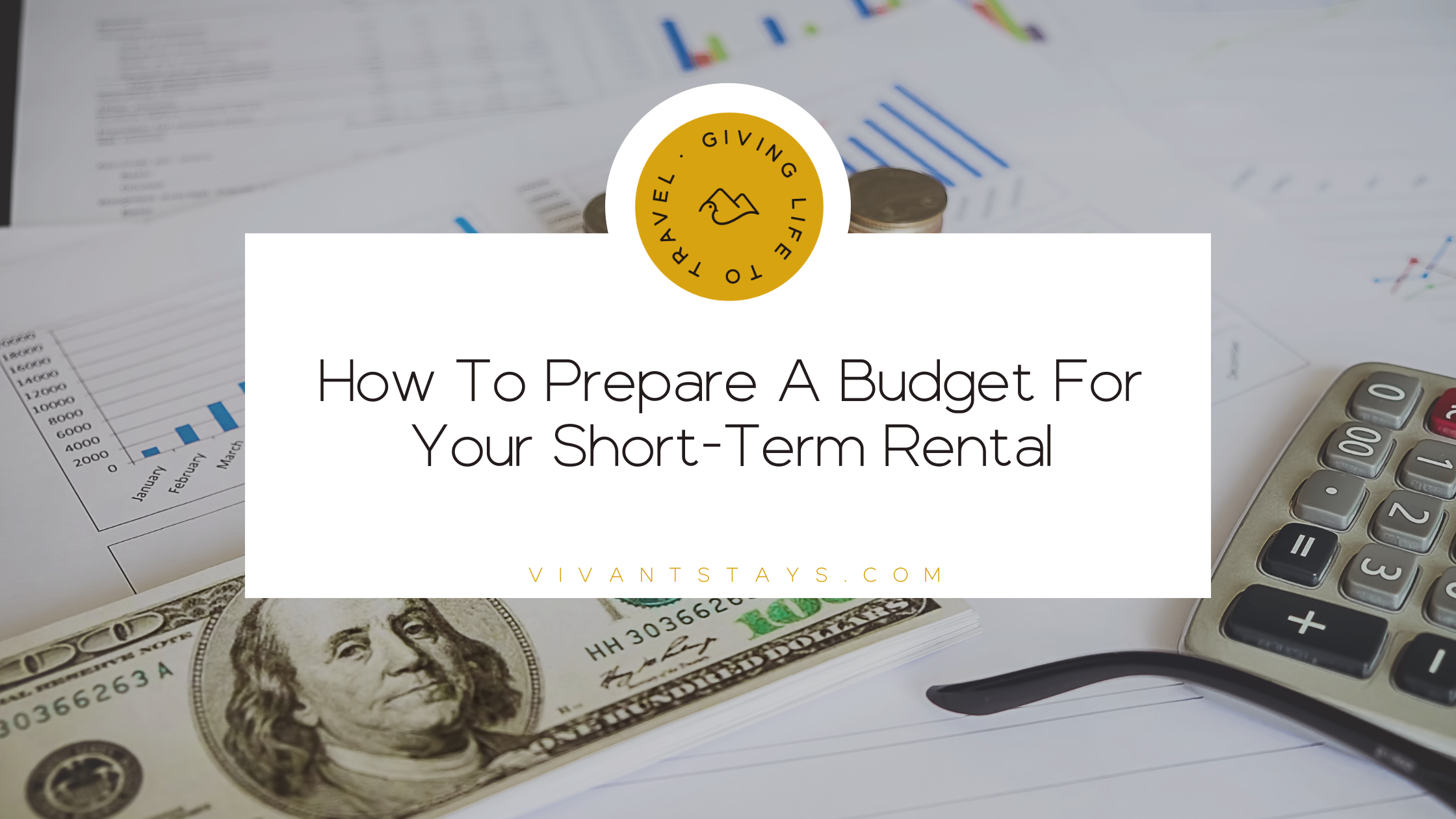Creating a budget for a short-term rental can be a daunting task, especially if you’re new to the process. But it doesn’t have to be! Setting up a budget is essential to ensure you stay within your means and get the most out of your rental experience. The key is knowing what expenses you can expect, determining the amount before selecting items, and being realistic with your budget.
Understand local and state regulations
Before starting your short-term rental, research your local and state regulations. If you’re located in a small town, housing and commercial zoning might be more strict in terms of where short-term rental properties can be located. Confirm if there’s an application process you need to go through or fees you have to pay.
Tax Implications to Expect
Property ownership and real estate investing have substantial tax benefits. You can deduct the total of the rental expenses to help you reduce taxes. Some states have occupancy taxes, while others may have a monthly or yearly fee for listing your property. Make sure to talk to your tax professional and abide by the law in your state.

Plan your monthly financing
The first step in making a budget for a short-term rental is figuring out what expenses you will incur. This includes rent costs (or mortgage payments) plus any maintenance fees, such as local taxes or insurance. It’s also important to factor in utilities. Additionally, think about furniture or other items you may need to purchase in order to make your short-term rental more attractive or comfortable for guests.
Be sure to also include any “just in case” costs that might arise during the course of renting out your property – things like repairs or unexpected cleaning fees are important to account for, even though they may not happen every time someone rents your space. The importance of such is you will not be sacrificing your personal finances on your short-term rental business.
Utilities
This includes electricity, water, and internet access. Depending on the type of property you’re renting out, you may need to consider additional utility costs such as cable or internet. Additionally, if your rental is equipped with amenities like a washer and dryer, you should factor in the cost of running and maintaining these amenities. Knowing your expected utility costs upfront will help you properly budget for them and provide you with a realistic estimate.
Maintenance and repairs
Unfortunately, plumbing problems or broken furniture can be costly for any business in real estate. In addition to emergency maintenance and repair on appliances and electrical systems, landscaping, pest management, painting touch-up services, or house repair costs are often sneaking up on property management owners. Maintenance can be tricky to estimate, but it must be planned to cover unexpected expenses. Some landlord companies have loose rules for how much a property can cost. The average estimate for annual maintenance costs varies according to square footage.
Assurance
We have all heard one or two short-term rental horror stories of squatters or outrageous parties. Make sure to buy the most comprehensive insurance plan you have available to cover yourself and your short-term rental.

Your Starting Budget
This is where your short-term rental investing comes into play. Planning out your starting budget will save you from overspending. Nonetheless, this will be an investment that might require several thousand dollars if you’re starting your short-term rental property from scratch. A good property manager will take into account what is required to invest in the property.
Supplies, miscellaneous, and decoration
Guests will be expecting linens, towels, and toilet paper. A poor supply of such could result in a bad review of your short-term rental. Popular amenities commonly mentioned in reviews include a coffee maker, washer and dryer, and other supplies. Other factors to consider will be if you want to provide shampoo, conditioner, and body wash. Although this will require additional spending on supplies and monthly maintenance, it could make a difference between your guest booking your property again or not.
Security
Invest in the security of your property with outdoor security cameras and keypad locks. Not only will these ensure your short-term rental is safe at all times, but as well help with any insurance claims that might arise.
Furnishing
For short-term rentals, many guests seek unique aesthetics when they search for properties; therefore, you must consider furniture and decoration. The space that’s provided makes a difference for guests between choosing a hotel or a short-term rental property. After all, there’s “data to support the correlation between good interior design and increased property value.”
If you have fewer funds, you can buy bargains in a second-hand store to save money. New short-term rental owners overspend on their budget because they plan for prestigious things like beds and dinner tables but do not consider the little details. This includes your decoration that plays into your target market.
Additionally, it’s worth noting that sticking too closely to the set budget numbers may lead to lower quality furnishings and supplies than desired; however, going overboard on certain items could blow up your entire budget if not careful. Balance is key here: consider getting quotes from different vendors so that you can make an educated decision on which pieces of furniture best fit into both style and cost categories. The goal is to make a welcoming and comfortable environment.
Platform services fees
A detail that must be taken into consideration is your platform services fees. This will be included if your property doesn’t have its own website. The host fees range from 3.5 percent with Airbnb to a 15 percent rate with Booking.com. Make sure to double-check the fees that are going to be accruing with all your bookings if you decide to market your short-term rental business through these online listing platforms.
Create a rental agreement
Creating a rental agreement will help avoid any confusion or problems that might arise with guests. Your agreement can vary, whether it will be a short or long lease term. It may include booking nights, late fees, cancelation fees, and refunds. Whether you pay someone to outline it for you or you do it, spend time creating a thorough and fair agreement.
Cleaning
Does it take time and attention to detail to make an excellent rental experience visible to guests? This is often overlooked or taken for granted in short-term rental properties — hence a whole sector of problems emerge in providing a good, clean rental. Cleaning a short-term rental property requires much more than a normal home.
Cleaning technicians have to do laundry and clean the house properly, and they have to replenish essential supplies like toiletries. Typically the guest pays for a cleaning fee when booking short-term rentals, but you need to figure out the costs and decide the price.
Depending on your contractual agreement with your cleaning service, this may become a monthly expense or by booking.

Consider hiring a property management company
Property management can be time-consuming. Hiring a property manager will be an option if you’re looking to make more passive income and be hands-off. Your property manager can help you with pricing, any pressing issues that arise, your monthly or yearly loss statement, profit, taxes, and regular maintenance of your rental property. Taking this route will help you save time and focus on other investments you may have.
Lastly, this option should not come at a much higher cost for you. Research your options, how involved you would like your managing company to be, and the money you will be investing. Whether it’s your first property or your fifth, the deal you get with a property management company can save you time, money, and headaches.
Read more in 7 Qualities of a Good Property Manager
Know how much income you can expect
The short-term rental industry can be very lucrative. It is possible to make $1,000 -2,000 monthly on a single property. Luxury houses can earn between $3000- $5k per month. This means you could financially independently purchase 3-4 properties. Set the plan for yourself. How many bookings per month are necessary for profitable rental income?
In conclusion, a well-thought-out budget is essential to running your short-term rental business successfully. Make sure you take into consideration all the costs associated and what will save money in the long run. Knowing how much income you can expect from your rental is also important in setting realistic goals for yourself. With careful planning and research, you can achieve a profitable rental income and make the most of your short-term rental business.
